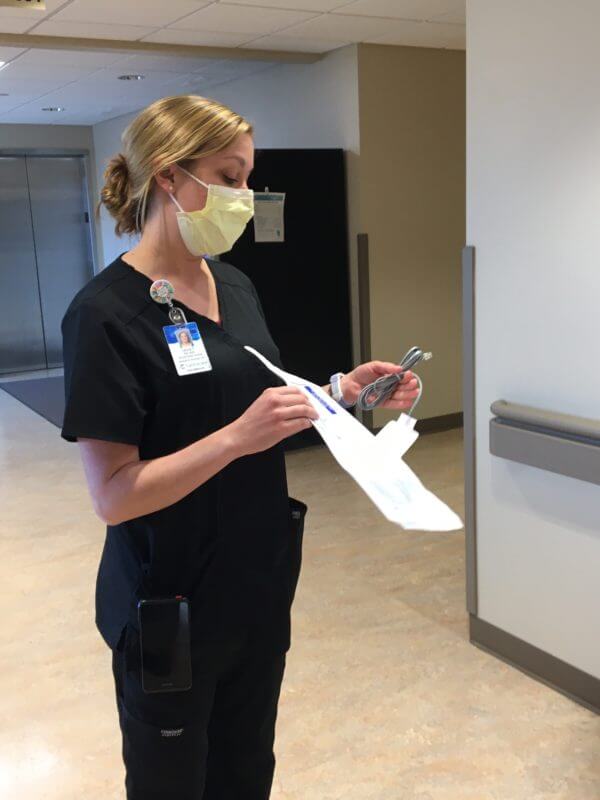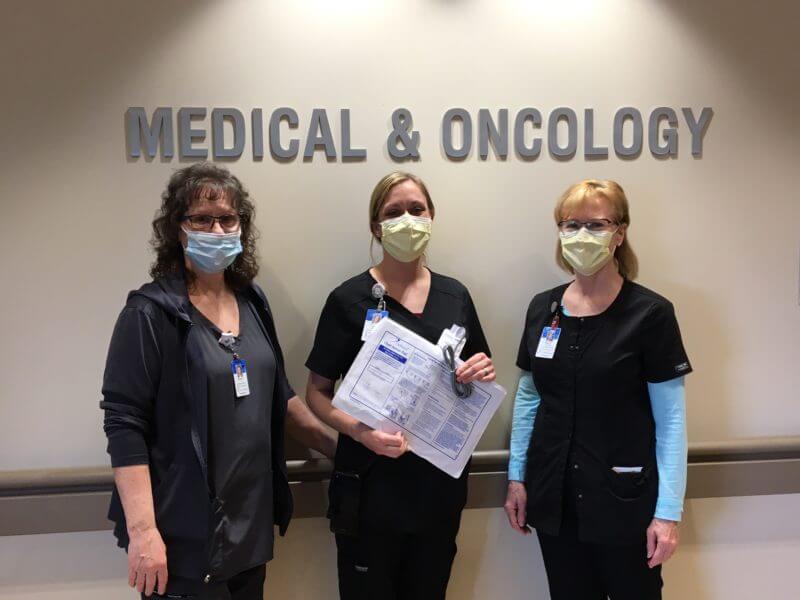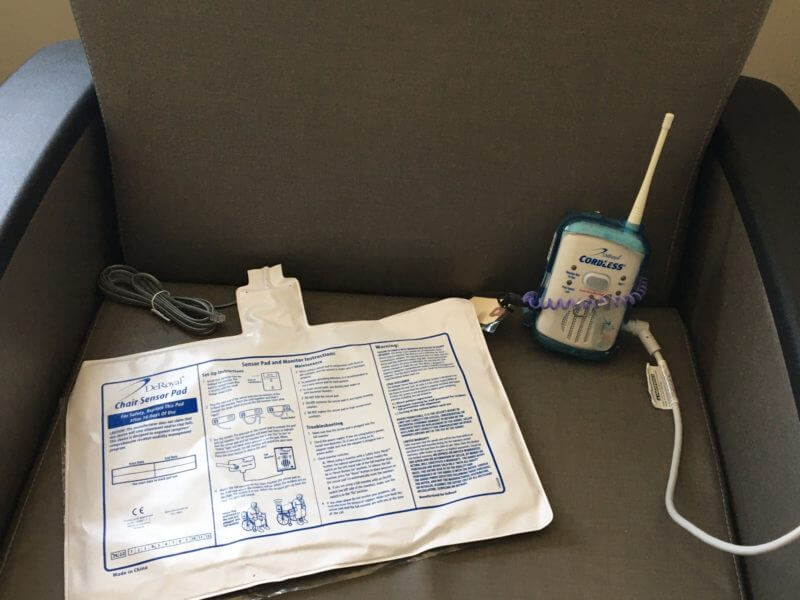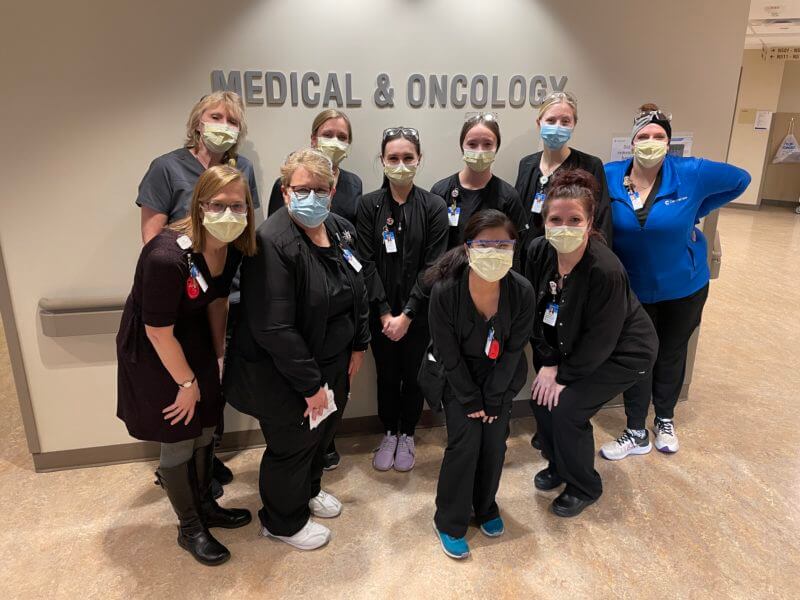40 Days Without a Fall
It started with listening
Sometimes all it takes to make a significant improvement in patient care and safety is listening to your team.
For the Medical and Oncology Unit at St. Cloud Hospital, a simple change in equipment led to 40 days without any patients experiencing a fall. Charge Nurse Laura Tokkesdal says that in the middle of a pandemic, such a success was a cause for celebration among staff.
“They lit up, they were excited. They were like, yes, something’s changing. And that I think was pretty cool.”
The change involved a chair alarm.
“So when the patient sits down on the chair, there’s a pad underneath them that hooks up to an alarm. When they stand up, the alarm goes off, alerting staff that they’ve risen from their chair and need help.”

But the particular model of chair alarm the unit employed was wireless; Tokkesdal says staff found it problematic.
“It was a pretty complicated device,” she explained. “There are five steps for setting it up. It took a lot of time. It wasn’t easy to remember if you hadn’t done it in a while and it was really frustrating to staff. The longer we used it, we also learned that it wasn’t the most trustworthy product. It didn’t always alarm.”
And then Diane Winkelman, one of the nursing assistants, put her foot down.
“She’s one of our all stars,” said Tokkesdal. “And she just said ‘I can’t use this product. I don’t trust it. It takes too much time. And it doesn’t work.’ I thought, oof, if she’s saying this, that’s a big deal.”
Tokkesdal brought up the issue with the fall committee and went through a review process with the product representatives. She says she couldn’t have advocated successfully without the support of Melinda Jennings, who at the time was the educator for the Medical and Oncology unit.

“I was nervous doing this because we were trying to get rid of a new fancy product,” she said. “But Melinda had my back, a hundred percent.”
Jennings says the nursing assistant’s complaint could have fallen on deaf ears, but Tokkesdal chose to take the matter seriously.
“Laura is a leader within the department,” said Jennings. “She’s definitely a great advocate, both for patients and patient safety, with all of her work. But she’s also a charge nurse; she is knowledgeable and colleagues know that they can go to her to voice a concern. She’s trusted to speak up and if changes need to happen, Laura will be the voice for clinical staff.”

Ultimately the unit opted for a corded chair alarm, which was both simpler and cheaper.
“So it’s the same box, but it’s a cord that goes into it instead of the wireless capability,” said Tokkesdal. “That took away the five steps – it’s now one step. It also took away the unreliability.”
Tokkesdal says while it might not sound like a big deal, that simple change made a huge difference. It freed up staff time, improved safety and, eventually, led to a 40-day streak without a single patient fall.

Jennings says that in a unit where patients are particularly fragile and vulnerable, advocating for their safety is important. “It’s part of our culture of safety that when you see something or feel as though there’s an opportunity or a concern, we just have to talk about it,” she explains. “And there aren’t any punitive consequences when you do raise a concern.”
Jennings adds that while not everybody always gets what they want, eliminating hierarchies in communication has led to greater trust across the team, and has empowered staff to speak up when they see a problem that needs to be fixed.








Great work team. A wonderful job of listening to everyone within your team, learning, and keeping safety at the forefront of your care!!
Such a great example of recognizing an opportunity and collaborating to find a win-win solution that is patient-centric! I have immense gratitude for the Medical & Oncology team for your commitment to our patients and one another!
Great work Med Onc. I love that you listen. That you count every team member worthy of having an opinion. That it doesn’t take moving mountains to make change happen. Great model for us all.
Great work and huge accomplishment!! Great example of fostering a safe environment to speak up and make changes based on feedback. Shared governance in action!
What a wonderful story! Thank you for advocating for patients and staff. It takes a team to truly understand the barriers to success and you continued to ask the questions. The culture the team has is leading to a safer environment for all we serve. Thank you!
This is a wonderful article! Thank you for your focus on patient safety, staff feedback and overall communication.
Such a great accomplishment. Diane identified and worked with Laura and Melinda to solve a problem together, as a team. They took time to understand what was contributing to patient falls. This is our culture in action – Listening, How Big is your Team and Remaining Curious. This example demonstrates how culture is foundational to becoming a high reliability organization. Thank you for creating a safe environment for those we serve.